Editoral
NCDC steps up measures to control cholera outbreaks amidst COVID-19 pandemic
Posted: 26-08-2021 11:45:08 AM
The global community is currently responding to the largest and longest pandemic in modern times – coronavirus disease (COVID-19) pandemic. Till date, many lives have been lost across all affected countries. Worse still, Nigeria and other West African Countries are vulnerable to other epidemic prone diseases. Currently, Nigeria is experiencing cholera outbreaks with associated significant morbidity and mortality. States with high level of rainfall are worst hit due to flooding. Aside being endemic and seasonal in Nigeria, cholera is also common in environments with high level of poor sanitation, lack of clean food and water, and areas where open defecation is common practice.
Cholera is transmitted through faeco-oral route i.e. spreads when water contaminated by excreta from infected people is consumed by otherwise healthy individuals. Symptoms include sudden acute watery diarrhoea in children and adults with or without vomiting, nausea and weakness. Cholera is highly contagious and in severe cases, can lead to death within hours. However, if detected early, it can be treated through prompt administration of oral rehydration solution (ORS) and supportive treatment.
Apart from huge resources invested in the current response to COVID-19, Nigeria Centre for Disease Control (NCDC) is not losing sight of the ongoing cholera outbreaks. We have supported states through deployment of rapid response teams, development and dissemination of National Acute Watery Diarrhoea Guidelines, deployment of cholera rapid diagnostic kits, etc. to the affected states.
Previously, the NCDC issued public health advisory which has contributed to increased public awareness in which significant morbidity and mortality have been averted. Given the current COVID-19 situation, and peak of rainy season, the NCDC again advises that Nigerians continue to take the following precautionary measures:
Ensure water is well boiled before drinking and bottled water is properly sealed. Store boiled water in a clean and safe container
Wash your hands frequently with soap and clean water. Use alcohol-based hand sanitiser if soap and water are not available
Ensure all food is well cooked before consumption. Avoid raw foods such as fruits and vegetables, except you have washed them in safe water or peeled them yourself.
Avoid open defecation and indiscriminate refuse dumping and ensure proper disposal of waste and clearing of sewage
If you experience sudden watery diarrhoea, please visit a health care facility immediately and take all sick persons with the signs or symptoms above to a health care facility immediately.
The states are again urged to ensure interventions towards cholera control. Priority should be given to early reporting of suspected cases, provision of Water, Sanitation and Hygiene (WaSH) facilities, medical supplies, and institutionalisation of proper case management practices.
The National Cholera Technical Working Group coordinated by NCDC will continue to work closely with all states, relevant stakeholders and partners, to provide the necessary support for cholera control in Nigeria.
Summary of Incidents
Notes
1. Information for this disease was retrieved from the Technical Working Group and Situation Reports
2. Case Fatality Rate (CFR) for this disease is reported for confirmed cases only
3. Information for this disease was retrieved from IDSR 002 data
4. CFR for this disease is reported for total cases i.e. suspected + confirmed
5. Information for sentinel influenza was retrieved from the laboratory
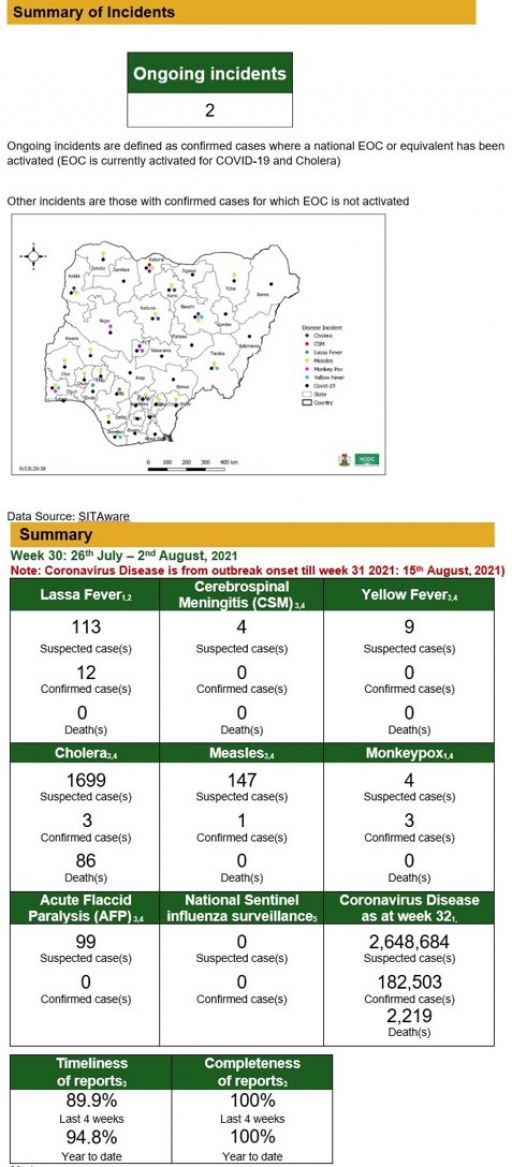
Lassa Fever
Key points
- There were 133 suspected cases, 12 were laboratory confirmed and no death was recorded from 33 LGAs in 11 states
Actions
To date:
- Conducted 2021 Lassa fever (LF) high burden states preparedness/response engagement meeting
- Dissemination of reviewed case management and safe burial practices guidelines
- Ensured all five LF molecular laboratories in the NCDC network are working at full capacity for timely testing of samples with reduced turnaround time

Cerebrospinal Meningitis (CSM)
Key points
- There were four suspected cases of cerebrospinal meningitis (CSM) reported from two LGAs in Katsina state. None were laboratory confirmed and no death was recorded.
Actions
To date:
- National CSM TWG meets weekly to review reports from states and plan appropriately
- Enhanced surveillance in all states
Planned:
- Continue harmonisation of the national line list and SORMAS data
- Continue to ensure that states reporting cases send their line lists and collect CSM samples

Yellow Fever
Key points
- There were nine suspected cases of Yellow Fever (YF) reported from eight LGAs in seven states. None were laboratory confirmed and no death was recorded
Actions
To date:
- National YF multi-partner Technical Working Group (TWG) continues to coordinate activities across states.
- Daily monitoring and analysis of surveillance data across the country to guide response activities
- Commenced yellow fever testing for the South-East and South-South at University of Nigeria
Teaching Hospital Enugu and University of Benin Teaching Hospital Benin City respectively
Planned:
- Continue implementation of the Incident Action Plan (IAP) and mobilise required resources for yellow fever preparedness
- Develop a protocol to guide response in states/LGAs with YF confirmed cases where vaccination campaigns have been conducted
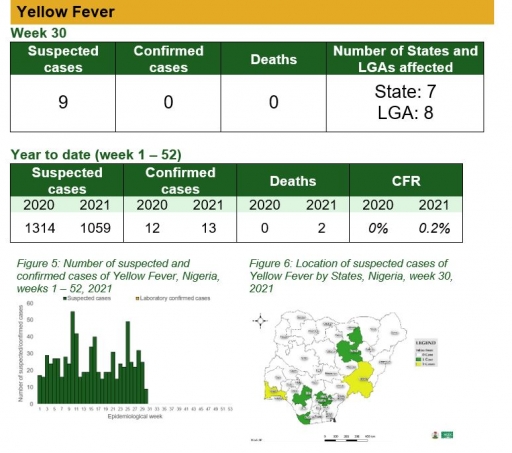
Cholera
Key points
- There were 1699 suspected cases of cholera reported from 65 LGAs in five states and FCT, three were laboratory confirmed and 86 deaths were recorded
Actions
To date
- National Cholera Multi-Sectoral Technical Working Group (TWG) is monitoring all states and supporting affected states
- National Rapid Response Teams (RRTs) with response commodities were deployed to support the response in all affected states
- Cholera jingles being aired in English and local languages across the country
Planned:
- Continue follow up and monitoring of non-reporting states
- Build capacity for sample collection, transportation, and laboratory diagnosis across states
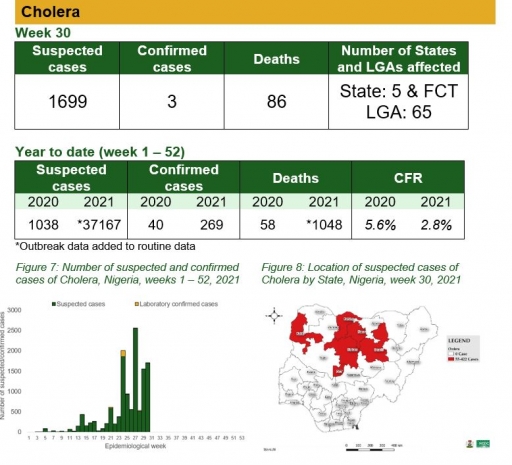
Measles
Key points
- There were 147 suspected cases of Measles reported from 58 LGAs in 19 states. None were laboratory confirmed and no death was recorded
Actions
To date
- National Measles TWG is closely monitoring measles surveillance data and providing feedback to relevant agencies and development partners
- Ongoing weekly surveillance and laboratory data harmonisation
Planned:
- Intensify follow up with states to update and transmit line list
- Continue monthly measles surveillance data review

Monkeypox
Key points
- There were four suspected cases of monkeypox reported in three LGAs in two states and FCT (Niger – 1, Ogun – 2 & FCT - 1). - - There were three laboratory confirmed cases and no death was recorded
Actions
To date
- Enhanced Surveillance ongoing in Rivers, Delta and Bayelsa States
- National Monkeypox Technical Working Group (TWG) is monitoring activities in all states
Planned:
- Enhance surveillance for monkeypox in high burden states
- Continue harmonisation of the national line list and SORMAS data
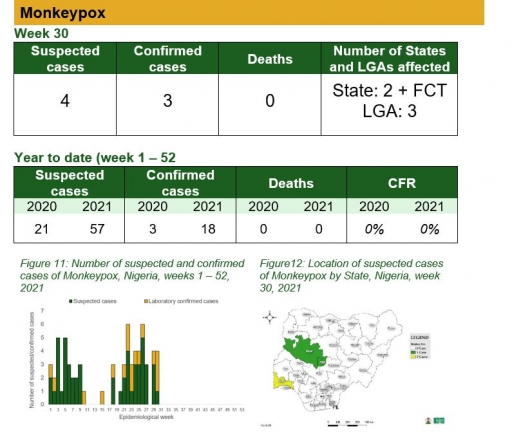
Acute Flaccid Paralysis (AFP)
Key points
There were 99 suspected cases of AFP reported from 76 LGAs in 17 states and FCT. None were laboratory confirmed and no death was recorded.

National Influenza Sentinel Surveillance

Coronavirus Disease (COVID-19)
Actions
To date:
- National COVID-19 multi-partner Emergency Operations Centre (EOC) continues to coordinate response activities across states
- Held emergency meeting with partners to identify priority activities for response to the third wave of the pandemic
- Received donations of ventilators and pulse oximeters from WHO to be distributed to the treatment centres for the management of COVID-19 cases
- Supported Molecular Diagnostic Laboratory (MDL) Gombe, Yusuf Dantsoho Memorial Hospital Kaduna, Nasarawa State specialist hospital, and National Reference Laboratory (NRL) Gaduwa with laboratory consumables and personal protective equipment (PPEs)
Planned:
- Deploy antigen-based rapid diagnostic test (Ag-RDT) kits and sample collection materials to the selected states
Intensify genomic surveillance activities
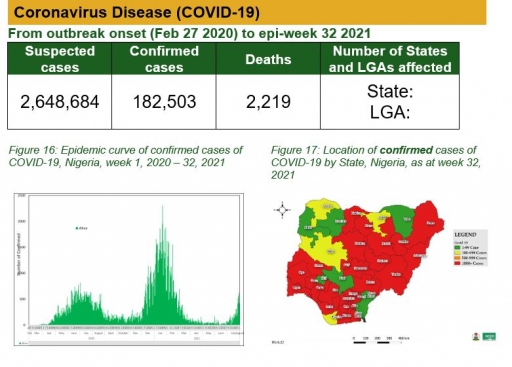
Timeliness and Completeness of Reports
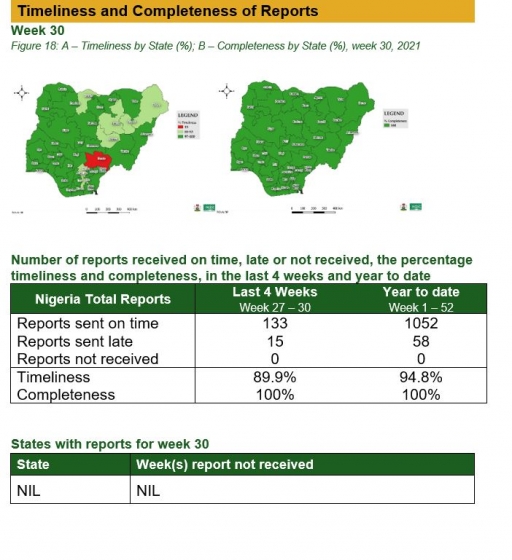
Timeliness and Completeness of Reports by State
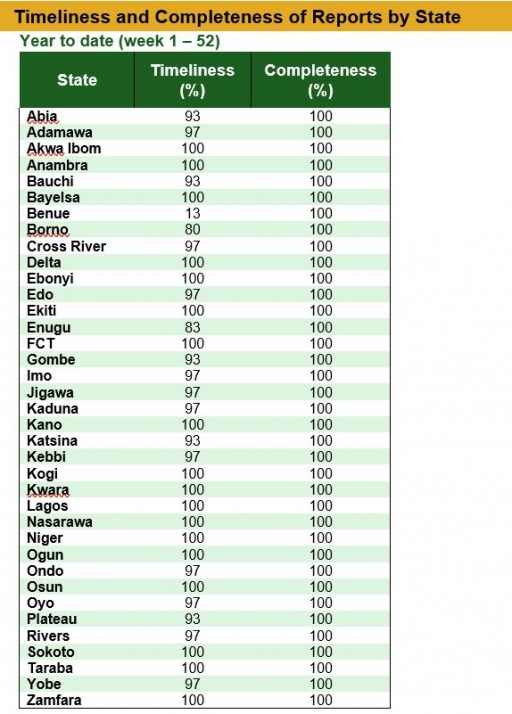














 Toll Free Number: 6232
Toll Free Number: 6232 Whatsapp: +234 708 711 0839
Whatsapp: +234 708 711 0839 SMS Number: +234 809 955 5577
SMS Number: +234 809 955 5577 